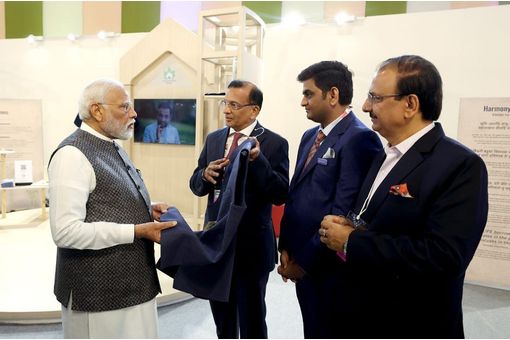Interviews
'RFID carries unconditional guarantee of success' - Study
07 Feb '09
17 min read

— Cheap production (with the emphasis on printed antennas and conducting polymers),
— Speed of data processing (software should process the large volume of data collected in real time if at all possible instead of only in batch processing with a time lag and thus produce decision-relevant information as quickly as possible),
— Reading errors (in particular, it is important to undercut the tolerable error rate for the process during bulk reading). In addition, there are four points on the politics side:
— Frequency harmonization (on the use of important frequency bands in particular regions),
— Standardization (this is about data formats, air interfaces, communication protocols),
— Health protection and environmental protection (concentrates on harmful materials in the RFID tags),
— Data protection and data security (in particular, focus is on the right of the consumer to decide on information related to his or her person).
The significance of the political aspects has an unequal weighting in the different application areas of RFID. For instance, the two aspects of data protection and data security as well as health protection and environmental protection are particularly important when the consumer comes into direct contact with the technology. By contrast, the two aspects of frequency harmonization and standardization play a particular role in international goods trade.
Difficulty of agreement in complex web of interests:
Apart from these differences in weighting, all these areas of activity have in common that numerous interests in business, technology and society – in some cases even opposing ones – clash at the national and international levels. This complex mix of interest's means that only slow progress is being made in the agreement process – in spite of numerous efforts by various political institutions. This is holding back the development of the RFID market, which by nature is highly dynamic.
The difficulty of attaining a manageable political settlement between entirely warranted but opposing interests can be seen for instance in the dispute over the opt-out and opt-in-options in the retail trade. Opt-out means that the RFID tag on an article is only deactivated when a customer leaves a store if the customer expressly asks for this to be done. By contrast, opt-in means that the RFID tag on an article is only left activated when a customer leaves a store if the customer expressly makes this request.
This dispute between opting-out and opting-in puts policymakers in the line of fire between the demands of companies and those of consumer advocates. In this debate, the companies make a case for the opt-out by emphasizing that the full efficiency potentials can only be tapped in a comprehensive and distortion-free concept all along the value chain. By contrast, consumer advocates support the opt-in system by emphasizing the dangers for data protection.
— Speed of data processing (software should process the large volume of data collected in real time if at all possible instead of only in batch processing with a time lag and thus produce decision-relevant information as quickly as possible),
— Reading errors (in particular, it is important to undercut the tolerable error rate for the process during bulk reading). In addition, there are four points on the politics side:
— Frequency harmonization (on the use of important frequency bands in particular regions),
— Standardization (this is about data formats, air interfaces, communication protocols),
— Health protection and environmental protection (concentrates on harmful materials in the RFID tags),
— Data protection and data security (in particular, focus is on the right of the consumer to decide on information related to his or her person).
The significance of the political aspects has an unequal weighting in the different application areas of RFID. For instance, the two aspects of data protection and data security as well as health protection and environmental protection are particularly important when the consumer comes into direct contact with the technology. By contrast, the two aspects of frequency harmonization and standardization play a particular role in international goods trade.
Difficulty of agreement in complex web of interests:
Apart from these differences in weighting, all these areas of activity have in common that numerous interests in business, technology and society – in some cases even opposing ones – clash at the national and international levels. This complex mix of interest's means that only slow progress is being made in the agreement process – in spite of numerous efforts by various political institutions. This is holding back the development of the RFID market, which by nature is highly dynamic.
The difficulty of attaining a manageable political settlement between entirely warranted but opposing interests can be seen for instance in the dispute over the opt-out and opt-in-options in the retail trade. Opt-out means that the RFID tag on an article is only deactivated when a customer leaves a store if the customer expressly asks for this to be done. By contrast, opt-in means that the RFID tag on an article is only left activated when a customer leaves a store if the customer expressly makes this request.
This dispute between opting-out and opting-in puts policymakers in the line of fire between the demands of companies and those of consumer advocates. In this debate, the companies make a case for the opt-out by emphasizing that the full efficiency potentials can only be tapped in a comprehensive and distortion-free concept all along the value chain. By contrast, consumer advocates support the opt-in system by emphasizing the dangers for data protection.
Popular News
Leave your Comments
Editor’s Pick
Kimberly Morgan and Rik Veltman
K3 Business Technology Group PLC
Dr. Michael Duetsch & Man Woo Lee
UPM Biochemicals and Dongsung Chemical
































-Ltd..jpg?tr=w-120,h-60,c-at_max,cm-pad_resize,bg-ffffff)





.jpg?tr=w-120,h-60,c-at_max,cm-pad_resize,bg-ffffff)
.jpg?tr=w-120,h-60,c-at_max,cm-pad_resize,bg-ffffff)






